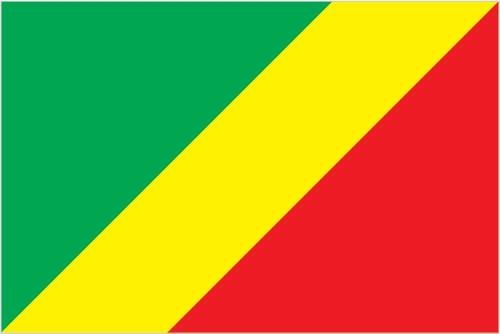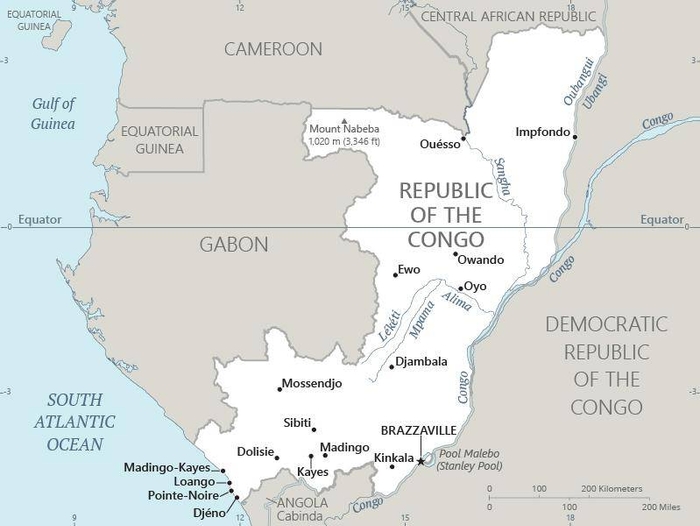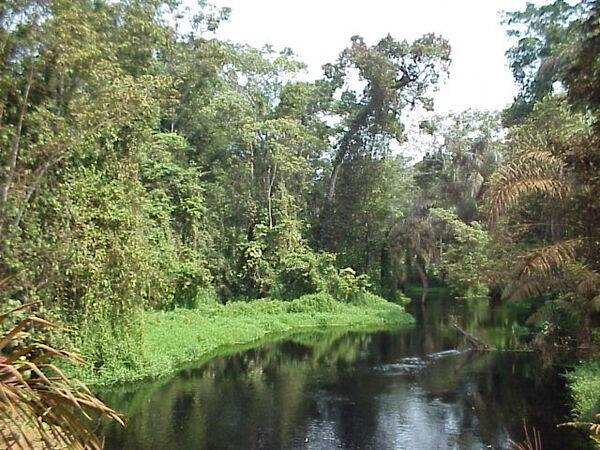188 Congo

Divided diagonally from the lower hoist side by a yellow band. The upper triangle (hoist side) is green and the lower triangle is red. Green symbolizes agriculture and forests, yellow the friendship and nobility of the people, red is unexplained but has been associated with the struggle for independence.
Flag courtesy of the CIA World Factbook

Map courtesy of the CIA World Factbook

A riparian section of the Congolese forest. Such land and stream interfaces are common in the rain forest of the Congo Basin.
Photo courtesy of the CIA World Factbook
Government
According to Britannica, under the constitution of 2002, Congo is a republic. The executive branch of the government is headed by the president, who is popularly elected to a maximum of two seven-year terms and serves as both chief of state and head of government. The president appoints the Council of Ministers. The legislative branch is bicameral and consists of the Senate and the National Assembly; members are elected to serve six-year and five-year terms, respectively.
For administrative purposes, Congo is divided into regions and districts. Brazzaville has the status of a capital district.
The constitution guarantees the independence of the judiciary. Congo’s judicial system includes the Supreme Court, Courts of Appeal, and the Constitutional Court. The president heads a Higher Council of Magistrates and nominates Supreme Court judges at the suggestion of that council. Supreme Court judges may not be removed.
National Agency for Civil Aviation (ANAC)
In the Republic of Congo, the National Agency for Civil Aviation (ANAC) created by Decree No. 78-288 of April 14, 1978 and reorganized by Decree No. 2012-328 of April 12, 2012, is the authority responsible for execution of the Congolese State’s policy on civil aviation and meteorology and the implementation of international standards and recommendations issued by the ICAO.
Airspace
SkyVector – Google Maps – ADS-B Exchange
ICAO countries publish an Aeronautical Information Publication (AIP). This document is divided into three parts: General (GEN), En Route (ENR) and Aerodromes (AD). ENR 1.4 details the types of airspace classes they chose to adopt from classes A through G. eAIP ASECNA
Drone Regulations
Advanced Air Mobility (AAM) Regulations & Policies
None found by the author.
However, should you, the reader, happen to stumble across something to the contrary, please email the author at FISHE5CA@erau.edu and you may be mentioned in the ACKNOWLEDGEMENTS section of this book by way of thanks for contributing to this free eBook!
Advanced Air Mobility (AAM) News
None found by the author.
However, should you, the reader, happen to stumble across something to the contrary, please email the author at FISHE5CA@erau.edu and you may be mentioned in the ACKNOWLEDGEMENTS section of this book by way of thanks for contributing to this free eBook!
Short Essay Questions
Scenario-Based Question
You have been hired by a Drone Startup Company. Your boss has immediately assigned this job to you.
They need you to prepare a one-page memo detailing the legalities of using a drone to film in the Congolese forest, pictured above.
They need you to mention any national laws and local ordinances.
They specifically want to know what airspace (insert pictures) you will be operating in and whether or not you need an airspace authorization.
Does it matter whether or not you are a citizen of the country?
Lastly, there is a bonus for you if, as you scroll through this chapter, you find any typos or broken links!
Short Essay Questions
- What are the drone categories?
- How is registration addressed?
- How is remote ID addressed?
- What are the model aircraft rules?
- What are the commercial drone rules?
- Are there waivers or exemptions to the rules? If so, for what?
- Would you share a link to an interactive airspace map?
- How is BVLOS addressed?
- How can you fly drones at night?
- How can you fly drones over people?
- Where do you find drone NOTAMs?
- What are the rules for drone maintenance?
- What are the rules for an SMS program?
- What are some unique rules not mentioned above?
- What are the C-UAS rules?
- What are the AAM rules?

